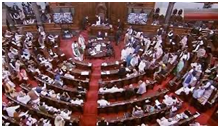The role of Parliamentary Committees
Context: It would not be wrong to say that Parliament in session is Parliament on public exhibition, whilst Parliament in Committee rooms is Parliament at work.’ Due to the sheer volume of information and scale of operations that the Indian Parliament is required to undertake, it is not feasible to take up all issues on the floor of the House. Thus, Parliamentary committees — panels made up of MPs — are constituted to deal with such situations and take up sector-specific concerns.
During the course of the 17th Lok Sabha, only 14 Bills have been referred for further examination so far. As per data from PRS, as little as 25% of the Bills introduced were referred to committees in the 16th Lok Sabha, as compared to 71% and 60% in the 15th and 14th Lok Sabha respectively. This represents a declining trend of national legislation being subjected to expert scrutiny.
The evolution of committees
- Parliamentary committees were formally established in 1993 but individual committees were being formed for various reasons as far back as independence.
- Both the Lok Sabha and the Rajya Sabha have their own Standing (permanent) Committees and Ad Hoc (need-based) Committees. There are also Joint Committees with representation from both Houses.
The role of committees
- Committees go into the details of a specific piece of legislation, analyse the impact it may have on governance indicators, and then make their recommendations.
- The government is required to table an ‘Action Taken’ report for the House to judge the progress made on the suggestions of the committee.
- Even though committee reports aren’t binding on the government, it helps the legislature ensure an oversight on the executive.
- For instance, during the recently concluded Budget Session, reports tabled on the Demand for Grants highlighted certain inconsistencies on the part of the government.
- The Committee on Rural Development & Panchayati Raj in its report noted that the revised estimates always fell short of the budget estimates.
- More importantly, the actual figures are also way less. In 2022-23, the Ministry of Panchayati Raj has been able to spend only ₹701 crore out of the allocation of ₹905 crore, approximately, at the revised estimates stage.
- Such objective assessments are only possible in the confines of a committee room, where partisan divides dissolve to make way for consensus.
- The alternative scenario, that is discussion on the floor of the House, involves glaring cameras that nudge parliamentarians to perform as per their respective party-lines and voter-base.
- There also exists the Business Advisory Committee which prepares the entire schedule of both Houses when Parliament is in session.
- Papers laid on the table of the House have a whole committee dedicated to them. So, the seemingly insignificant few minutes at the very beginning of each sitting which are utilised to lay said papers are actually backed by a well-oiled machinery of members.
- Each individual paper is prepared after a careful and often long-drawn process of deliberation, writing and screening. A lot goes into the functioning of Parliament and the committees shoulder a big chunk of that responsibility.
- Another important mandate of Committees is to go into issues that are crucial from a nation-building standpoint but don’t hold as much political significance. Take the example of defence shipyards.
- These shipyards are not a primary poll issue. However, it is extremely important to develop these capabilities for safeguarding the security of the nation.
- While next to no questions have been asked in the Lok Sabha on defence shipyards, the Public Accounts Committee highlighted several concerns plaguing the same in a 2015 report including but not limited to audit findings about inadequate shipbuilding practices, frequent mid-course changes, delays in finalisation of weapon packages, and an underestimation of costs by shipyards.
Way Ahead
- In the U.S., committees play a crucial role and Bills are referred to them post introduction for scrutiny. It allows changes to be made and the modified Bill to go for voting.
- The Parliament could consider a compulsory referral, for the Bills that are tabled on the floor, to the appropriate committees. Arming them with more powers will help them ensure accountability from the executive instead of making them toothless tigers.
- It is essential for the parliamentary ecosystem in India to institutionalise such procedures and not allow political considerations to hasten law-making.
| Practice Question
1. It would not be wrong to say that Parliament in session is Parliament on public exhibition, whilst Parliament in Committee rooms is Parliament at work. Elaborate. |




